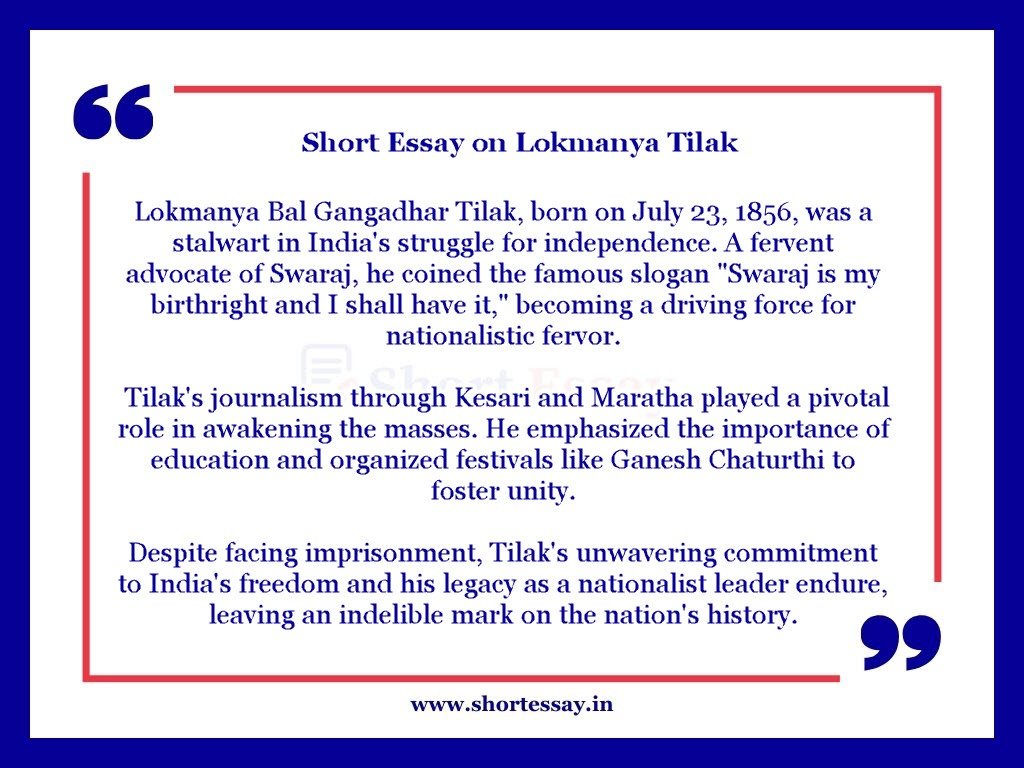Introduction
essay on bal gangadhar tilak 500 words, popularly known as Lokmanya Tilak, stands as an iconic figure in the history of India’s struggle for independence. Born on July 23, 1856, in Ratnagiri, Maharashtra, Tilak emerged as a multifaceted leader, contributing significantly to India’s political landscape and cultural resurgence during the British colonial era. This essay delves into the life, contributions, and lasting legacy of Bal Gangadhar Tilak.
Early Life and Education
Tilak was born into a Chitpavan Brahmin family, known for its intellectual prowess. His father, Gangadhar Tilak. Was a Sanskrit scholar and a school teacher. Instilling in young Tilak a deep appreciation for education. After completing his early education in Ratnagiri, Tilak pursued higher studies at Deccan College in Pune. His academic brilliance was evident as he excelled in mathematics and law, earning degrees that laid the foundation for his future endeavors.
Political Career
Tilak’s political journey began with his active involvement in the Indian National Congress. A staunch advocate of Swaraj, or self-rule, Tilak played a pivotal role in shaping the political discourse of the time. He was instrumental in organizing the first Congress session in Pune in 1895, marking the beginning of his leadership within the nationalistic movement.
Tilak’s emphasis on Swadeshi, the promotion of Indian-made goods, and his call for the boycott of British goods made him a key figure in the Swadeshi Movement. His newspapers, Kesari and Maratha, became powerful platforms for spreading awareness about India’s struggle against British colonialism. The fiery nationalist fervor in his writings earned him the title “Lokmanya,” meaning the beloved leader of the people.
Contributions to the Indian Freedom Struggle
Tilak’s contributions to the Indian freedom struggle were monumental. His famous slogan, “Swaraj is my birthright, and I shall have it,” echoed the aspirations of millions of Indians striving for independence. Imprisoned multiple times by British authorities for his vocal opposition, Tilak continued to inspire through his writings, particularly during his exile in Mandalay.
Tilak’s role in the formation of the Home Rule League in 1916, alongside Annie Besant, demonstrated his commitment to achieving self-governance for India. He actively supported Mahatma Gandhi’s Non-Cooperation Movement, advocating for the boycott of foreign goods and institutions. Tilak’s efforts in organizing public festivals, such as Ganesh Chaturthi, aimed at fostering a sense of nationalism and patriotism among the masses.
Social Reforms
Beyond his political pursuits, Tilak was a dedicated social reformer. He believed in the upliftment of oppressed classes and actively worked towards eradicating social evils. His establishment of the Deccan Education Society in 1884 aimed to spread education, particularly among women and lower castes, reflecting his commitment to social equality.
Tilak’s advocacy for women’s rights extended to his fight against child marriage and efforts to improve the status of widows. He promoted the idea of education as a means of empowerment and fought against discrimination based on caste and gender.
Cultural Renaissance
Bal Gangadhar Tilak played a crucial role in the cultural renaissance of India. His efforts to revive and promote Hindu culture and traditions during the British colonial era were instrumental. Tilak believed that religion played a vital role in shaping society and politics, and he actively promoted Hinduism as a way of life.
His support for public celebrations of religious festivals. Such as Ganesh Chaturthi. Aimed at fostering unity among Hindus and instilling pride in their shared history. Tilak’s emphasis on education also contributed significantly to the Hindu Rebirth movement. He established schools and colleges that combined traditional Indian knowledge with modern subjects, influencing the cultural landscape.
Legacy
Bal Gangadhar Tilak’s legacy endures as a symbol of India’s struggle for freedom and cultural resurgence. His contributions to the political, social, and cultural spheres have left an indelible mark on the nation’s history. The educational institutions he founded continue to impart knowledge, and his writings remain a source of inspiration.
Also read : “Kartavya Path Chronicles: Unraveling the Tapestry of Why Do We Celebrate Republic Day”
Conclusion
Bal Gangadhar Tilak’s life was a testament to his unwavering commitment to India’s freedom and cultural renaissance. His role as a political leader. Social reformer. And cultural icon shaped the trajectory of the Indian independence movement. essay on bal gangadhar tilak 500 words Tilak’s legacy continues to inspire generations. Serving as a reminder of the power of perseverance. Dedication. And courage in the face of adversity.







